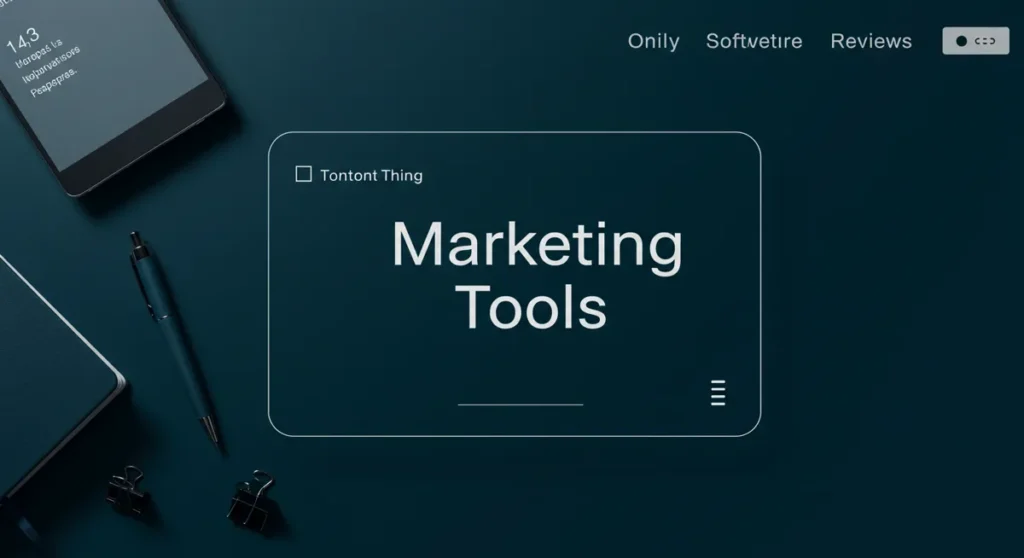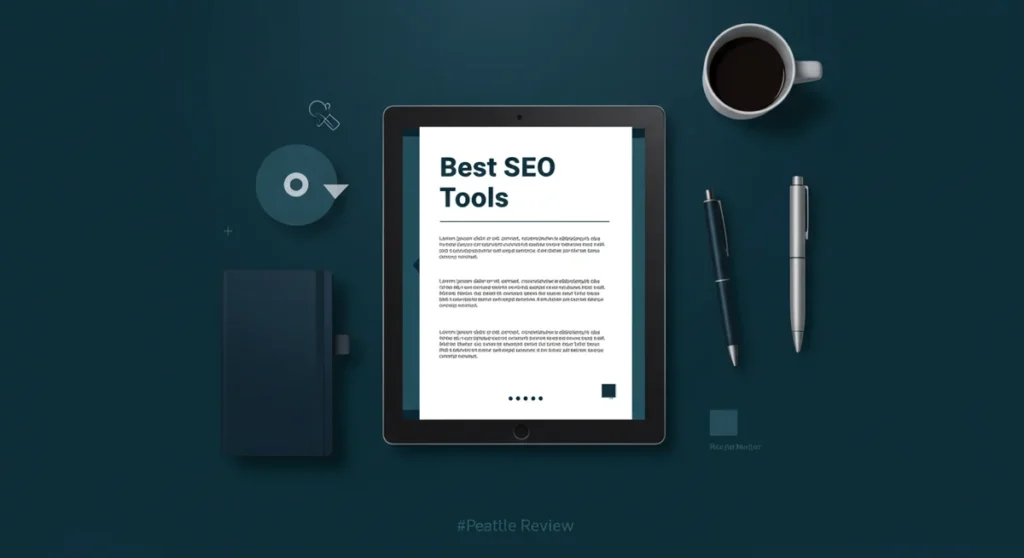Marketing automation is the key to scaling efficiently. It saves time and boosts productivity. Businesses can engage customers better, automate repetitive tasks, and nurture leads with ease. Tracking and analyzing campaign performance becomes simpler, leading to more informed decisions.
With the right tools, companies can grow faster by streamlining their marketing workflows. Marketing automation tools are designed to make life easier for marketers. They help you focus on strategy while automating the routine tasks that consume time and energy.
In this guide, we’ll explore the best marketing automation tools available. These tools are tailored for businesses looking to scale effectively and optimize their marketing efforts. Let’s dive in and find the right fit for your business.
What is Marketing Automation?
Marketing automation refers to using software and technology to automate marketing tasks. It helps businesses streamline and optimize their workflows, allowing them to efficiently manage marketing campaigns across multiple channels. By automating repetitive tasks, businesses can save time, reduce human error, and focus more on strategy and creative efforts.
Marketing automation tools can assist with lead nurturing, customer segmentation, email campaigns, social media management, and more. They also provide valuable analytics and insights to improve the effectiveness of marketing efforts. The goal is to create a seamless and personalized experience for prospects and customers throughout their journey.
For growing companies, marketing automation is crucial. It enables teams to handle a larger volume of leads without compromising on personalization or quality. By leveraging automation, businesses can ensure consistent communication with their audience, boost engagement, and drive conversions at scale.
Key Features to Look For in Marketing Automation Tools
When selecting a marketing automation tool, it’s important to consider the features that will best support your business’s growth. Here are some key features to look for:
- Lead Management: Choose tools that capture, segment, and nurture leads with personalized communication. Prioritize prospects with lead scoring and automated follow-ups.
- CRM Integration: Ensure seamless integration with your CRM for aligned sales and marketing, improved lead tracking, and easy access to customer data.
- Multi-Channel Marketing: Engage audiences via email, SMS, social media, and web push notifications for consistent, cross-channel experiences.
- Analytics: Opt for tools with robust reporting to track KPIs, analyze customer behavior, and optimize campaigns for data-driven success.
- Scalability: Select tools that grow with your business, handling more contacts, campaigns, and workflows without sacrificing performance.
- Personalization: Use tools offering segmentation and behavior-based targeting to create relevant, impactful campaigns.
- Automation Workflow: Look for a drag-and-drop builder to easily design, edit, and optimize workflows for smooth customer journeys.
By focusing on these features, you can choose a marketing automation tool that aligns with your business goals and helps you scale effectively.
Top 13 Marketing Automation Tools for Scaling Businesses
1. HubSpot Marketing Hub
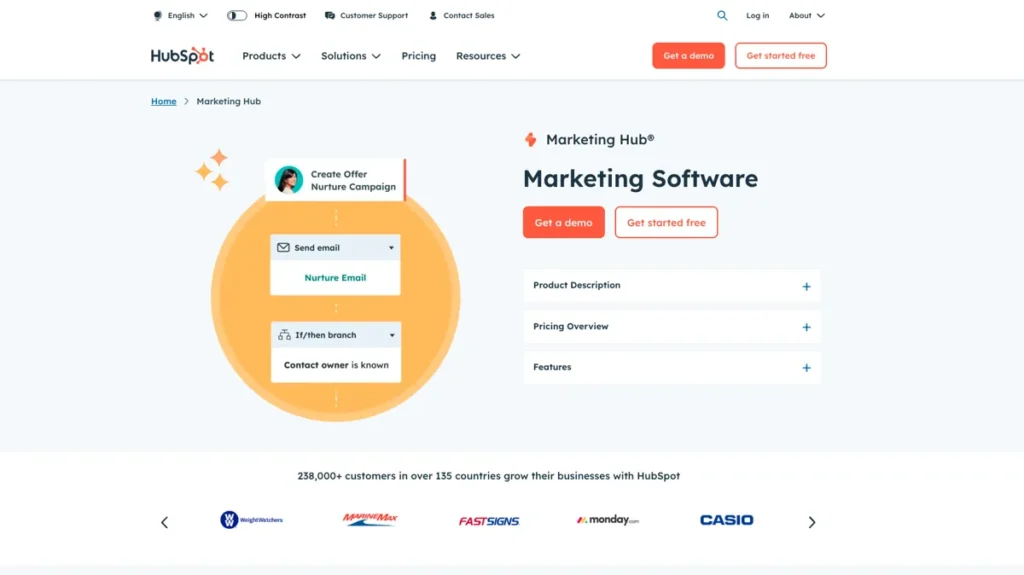
HubSpot is an all-in-one marketing platform designed for businesses looking to scale.
Overview: HubSpot Marketing Hub offers a comprehensive solution that integrates CRM, marketing automation, and lead management in one platform. The tool is highly versatile, providing a wide range of marketing functions including email marketing, social media scheduling, content management, and analytics. HubSpot’s user-friendly interface makes it suitable for both beginners and advanced marketers.
Features:
| Feature | Description |
| CRM Integration | Seamlessly integrates with HubSpot CRM, enabling better lead tracking and data management. |
| Lead Nurturing | Offers advanced workflows to nurture leads through personalized campaigns. |
| User-Friendly Interface | Intuitive dashboard and tools that make marketing automation easy to manage. |
| Email Marketing | Automated email sequences, A/B testing, and email tracking for enhanced engagement. |
| Social Media Management | Schedule and manage social media posts from within the platform. |
| Analytics & Reporting | Detailed insights into campaign performance, with customizable reports. |
- Best For: Small to medium-sized businesses and B2B/B2C companies that need an all-in-one marketing and CRM solution.
- Pricing: HubSpot offers a free version with limited features. Paid plans start at $50 per month, with more advanced tiers offering additional features and scalability.
2. ActiveCampaign

ActiveCampaign focuses on providing personalized automation and CRM capabilities, ideal for businesses looking to create in-depth customer journeys.
Overview: ActiveCampaign is a versatile platform that combines email marketing, CRM, and automation in a single tool. It’s known for its powerful segmentation and automation capabilities, allowing businesses to create complex workflows that deliver highly personalized experiences. ActiveCampaign also offers a built-in CRM that enhances sales and marketing alignment.
Features:
| Feature | Description |
| Email Marketing | Advanced email marketing with automation, split testing, and trigger-based workflows. |
| CRM Integration | Built-in CRM helps manage customer relationships and provides sales teams with essential insights. |
| Personalization | Advanced segmentation and personalization capabilities to tailor customer interactions. |
| Automation Workflows | Visual automation builder to design intricate customer journeys easily. |
| SMS Marketing | Engage customers via SMS as part of automated workflows. |
| Site Tracking | Track user behavior on your website to trigger timely follow-up actions. |
- Best For: Businesses with a focus on personalized customer journeys and those needing detailed segmentation.
- Pricing: ActiveCampaign’s plans start at $29 per month, with pricing based on the number of contacts and features required. Higher tiers include more in-depth CRM and automation capabilities.
3. Mailchimp

Mailchimp is known for its ease of use and AI-powered features, suitable for startups.
Overview: Mailchimp is a popular tool that offers email marketing automation, basic CRM capabilities, and multi-channel campaigns. It’s user-friendly and provides AI-driven insights to help businesses optimize their marketing efforts. Mailchimp supports a variety of integrations, making it easy to connect with other tools in your marketing stack.
Features:
| Feature | Description |
| Templates | Pre-built templates for easy setup of email campaigns. |
| AI Insights | Provides data-driven recommendations to improve marketing performance. |
| Omnichannel Campaigns | Supports email, social media, and other channels for comprehensive engagement. |
| Customer Journey Builder | Visual automation tool to map out customer journeys. |
| Analytics | Track campaign performance with detailed reporting. |
- Best For: Small businesses and growing startups looking for an easy-to-use platform for email marketing and basic automation.
- Pricing: Mailchimp offers a free plan for up to 2,000 contacts, with paid plans starting at $9.99 per month for additional features and scalability.
4. Marketo Engage (Adobe)
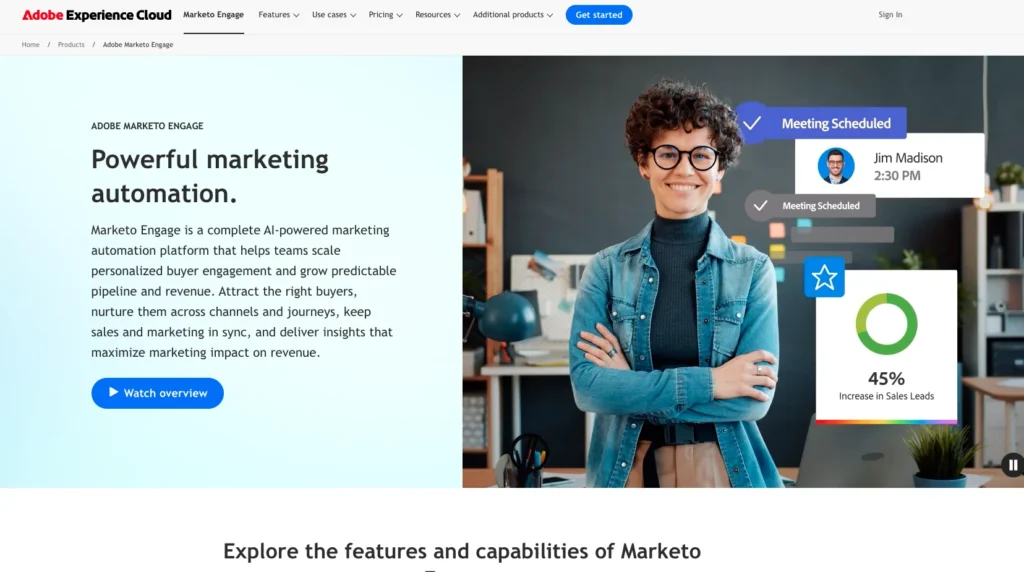
Marketo Engage is a robust platform ideal for lead management and B2B marketing automation.
Overview: Marketo Engage, now part of Adobe, offers a powerful marketing automation platform geared toward B2B enterprises. It provides features like lead scoring, account-based marketing (ABM), and detailed analytics. The platform is highly customizable, making it well-suited for complex marketing strategies and large teams.
Features:
| Feature | Description |
| Lead Scoring | Advanced scoring for lead prioritization based on behavior and engagement. |
| Account-Based Marketing | Tools to target specific accounts with personalized campaigns. |
| Complex Workflows | Customizable workflows for sophisticated marketing strategies. |
| Analytics | In-depth campaign analytics with performance tracking. |
| Email Marketing | Advanced email automation and A/B testing capabilities. |
- Best For: Enterprise-level businesses and B2B organizations with complex needs.
- Pricing: Pricing for Marketo Engage is available on request, as it is tailored to the needs of large enterprises.
5. Omnisend

Omnisend focuses on omnichannel marketing for e-commerce businesses.
Overview: Omnisend is designed specifically for e-commerce businesses that want to streamline their marketing across multiple channels. It integrates email, SMS, push notifications, and social media to create a seamless marketing experience. The platform also provides pre-built workflows tailored to common e-commerce scenarios, such as cart abandonment and welcome series.
Features:
| Feature | Description |
| Email & SMS Campaigns | Integrate email and SMS for cohesive customer messaging. |
| Push Notifications | Engage customers with push alerts to drive traffic. |
| Pre-built Automation | Ready-to-use workflows for e-commerce activities like cart abandonment. |
| Segmentation | Advanced customer segmentation for targeted messaging. |
| Integrations | Seamlessly integrates with major e-commerce platforms like Shopify and WooCommerce. |
- Best For: E-commerce brands looking to scale their omnichannel marketing efforts.
- Pricing: Omnisend offers a free plan with basic features, while paid plans start at $16 per month, depending on the number of contacts and channels used.
6. Marketing Cloud Account Engagement
(Salesforce)
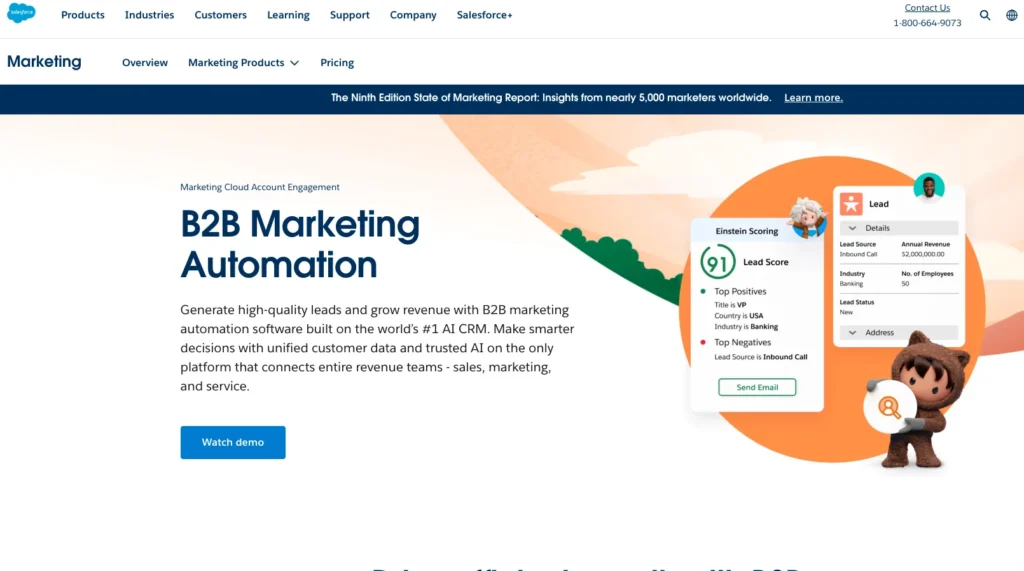
Marketing Cloud Account Engagement is designed for B2B marketing automation with deep CRM integration.
Overview: Marketing Cloud Account Engagement, part of Salesforce, is a marketing automation platform tailored for B2B companies. It integrates deeply with Salesforce CRM, making it an ideal choice for businesses that already use Salesforce. Marketing Cloud Account Engagement provides tools for lead management, email marketing, and ROI reporting, helping B2B marketers align their sales and marketing teams.
Features:
| Feature | Description |
| CRM Integration | Deep integration with Salesforce CRM for seamless data sharing. |
| Lead Scoring | Automatically score leads to prioritize follow-ups. |
| ROI Reporting | Measure the return on marketing investments with in-depth analytics. |
| Email Automation | Create automated email campaigns with personalized messaging. |
| Landing Page Builder | Build custom landing pages to support campaigns. |
- Best For: B2B companies needing deep Salesforce integration and robust lead management.
- Pricing: Marketing Cloud Account Engagement pricing starts at $1,250 per month, targeting larger enterprises and B2B teams.
7. Brevo
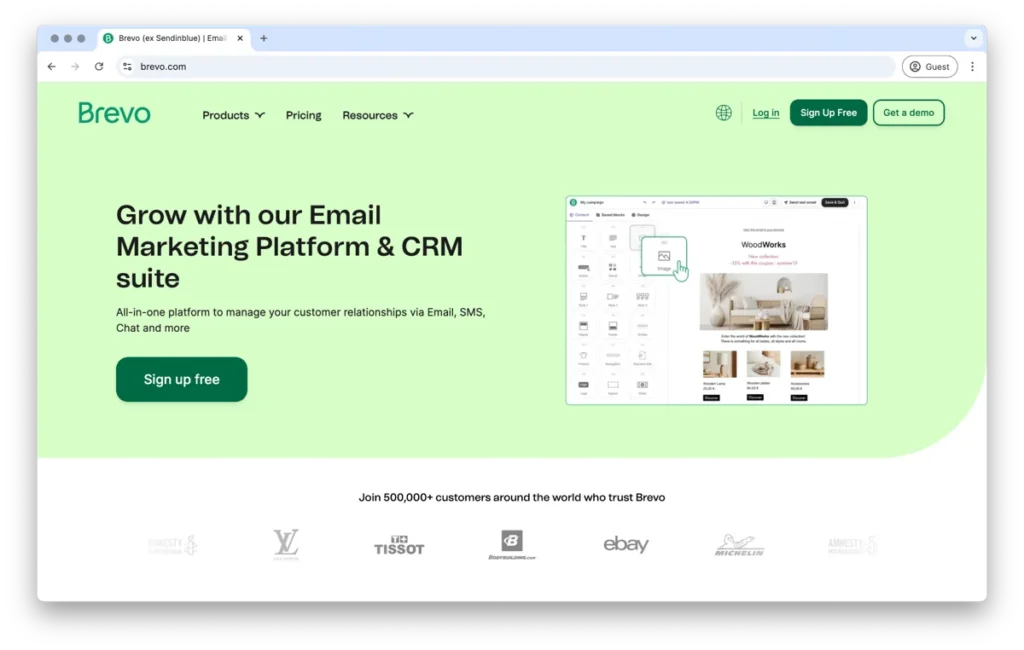
Brevo is an affordable, all-in-one marketing automation tool.
Overview: Brevo offers a cost-effective solution that combines email marketing, SMS campaigns, CRM, and basic automation. It’s especially popular with small businesses that need a budget-friendly yet feature-rich marketing platform. Brevo also includes transactional email capabilities, making it a good choice for businesses that need both marketing and transactional emails.
Features:
| Feature | Description |
| Email Campaigns | Create and automate email marketing campaigns with ease. |
| SMS Marketing | Send SMS campaigns to engage customers instantly. |
| CRM | Manage customer relationships and interactions. |
| Transactional Emails | Send transactional emails for e-commerce operations. |
| Marketing Automation | Automate workflows with pre-built automation templates. |
- Best For: Small businesses and budget-conscious marketers looking for a versatile tool.
- Pricing: Brevo offers a free plan for up to 300 emails per day, with paid plans starting at $25 per month.
8. Drip
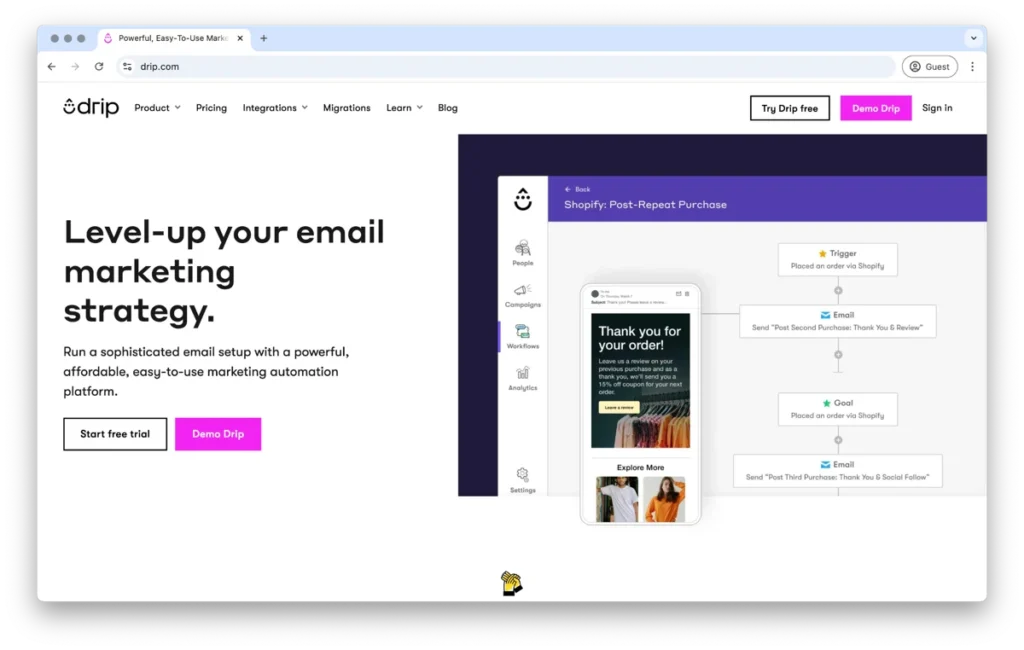
Drip is a marketing automation tool focused on e-commerce brands.
Overview: Drip is a powerful automation platform tailored for online retailers. It helps e-commerce businesses build personalized experiences through automated email workflows, segmentation, and detailed analytics. Drip’s integration with major e-commerce platforms makes it easy to track customer behavior and tailor marketing efforts accordingly.
Features:
| Feature | Description |
| Email Automation | Create and automate personalized email campaigns. |
| E-commerce Integration | Connects with platforms like Shopify, WooCommerce, and Magento for seamless data flow. |
| Customer Insights | Track customer behavior and use data to create targeted campaigns. |
| Segmentation | Segment customers based on actions, purchases, and engagement. |
| Multi-Channel Campaigns | Reach customers via email, social media, and more. |
- Best For: Online retailers and e-commerce brands looking to enhance their marketing efforts.
- Pricing: Drip offers a 14-day free trial, with pricing starting at $39 per month based on the number of subscribers.
9. GetResponse
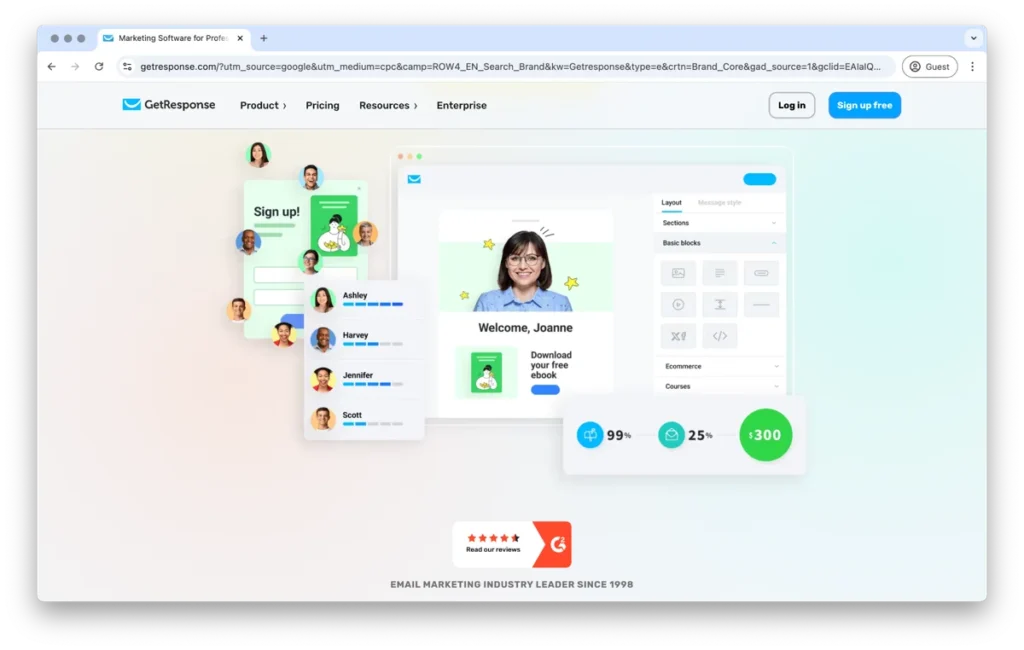
GetResponse offers marketing automation with a focus on webinars.
Overview: GetResponse is a versatile marketing automation platform that includes email marketing, landing pages, and webinar solutions. It is particularly strong in providing tools for businesses that leverage webinars as part of their lead generation strategy. GetResponse also offers powerful analytics to track campaign effectiveness.
Features:
| Feature | Description |
| Email Marketing | Automate email marketing campaigns with customizable templates. |
| Webinars | Host webinars to generate and nurture leads. |
| Landing Pages | Build landing pages to capture leads effectively. |
| Marketing Automation | Create advanced workflows to engage and convert leads. |
| Analytics | Track performance with real-time data and reports. |
- Best For: Businesses that utilize webinars for lead generation and need an all-in-one platform.
- Pricing: GetResponse plans start at $15 per month, with higher tiers offering webinar capabilities and more advanced features.
10. Keap
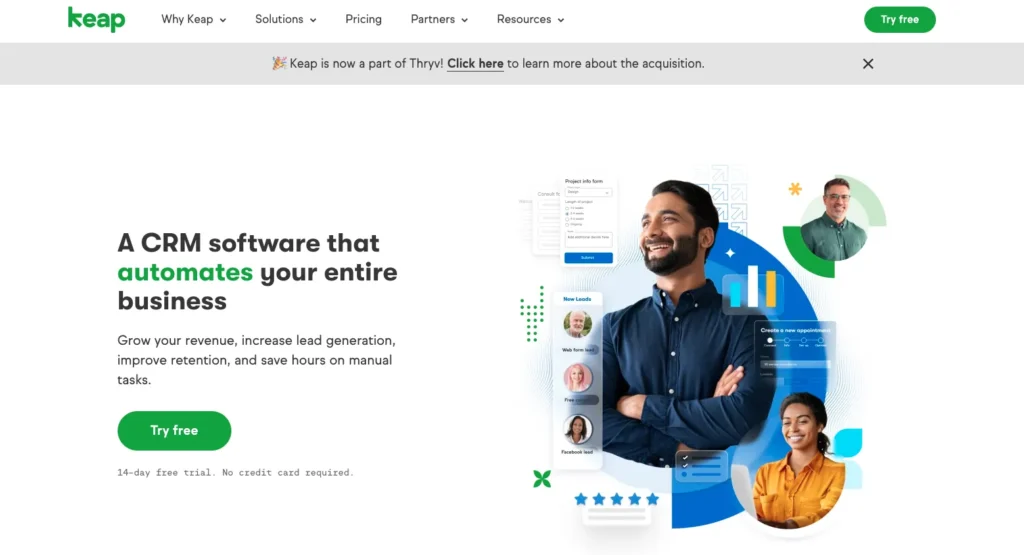
Keap combines CRM, email marketing, and automation into an all-in-one platform.
Overview: Keap, is a robust solution that blends CRM, email marketing, automation, and invoicing. It aims to help small businesses streamline operations, manage customer relationships, and automate repetitive marketing tasks. Keap’s simple interface makes it accessible even to those without technical expertise.
Features:
| Feature | Description |
| CRM | Manage client relationships and interactions effectively. |
| Email Marketing | Automate and send targeted email campaigns. |
| Invoicing | Send invoices, process payments, and track customer transactions. |
| Appointment Scheduling | Integrated tool to schedule meetings with clients. |
| Marketing Automation | Automate workflows and customer follow-ups. |
- Best For: Small businesses and solopreneurs needing a comprehensive CRM and marketing solution.
- Pricing: Keap pricing starts at $79 per month, with different tiers based on features and the number of contacts.
11. Ortto
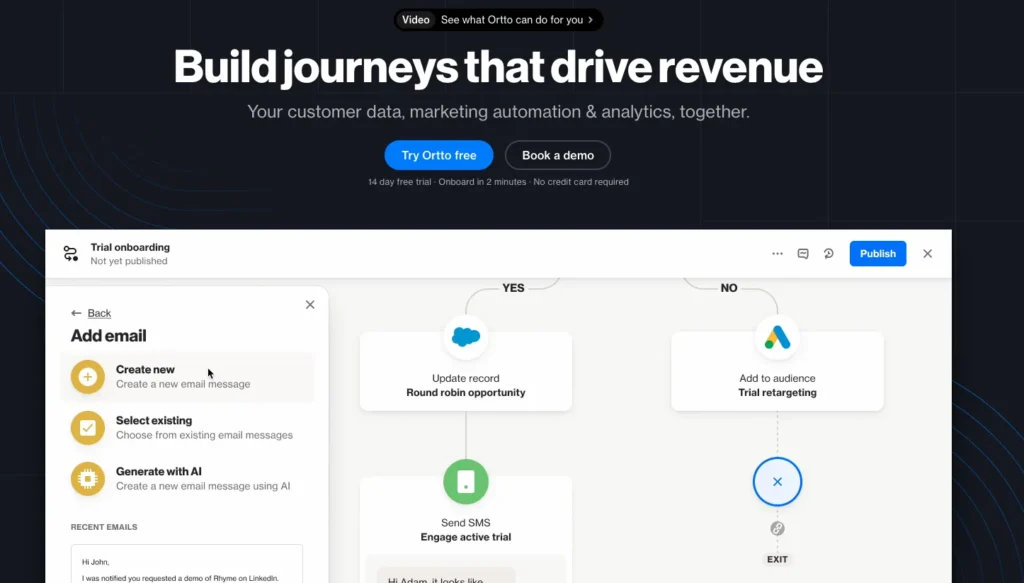
Ortto provides a visual way to automate marketing workflows.
Overview: Ortto is known for its visual approach to creating automation sequences. It allows marketers to design and map out customer journeys with a drag-and-drop interface. Ortto supports multi-channel marketing, including email, SMS, and in-app messaging, making it easy to reach customers at different touchpoints.
Features:
| Feature | Description |
| Journey Mapping | Visual workflow builder to design customer journeys easily. |
| Multi-Channel Engagement | Engage customers via email, SMS, and in-app messages. |
| Personalization | Create personalized experiences based on customer behavior. |
| Lead Nurturing | Automate lead nurturing workflows to move prospects through the sales funnel. |
| Analytics | Track engagement metrics and campaign performance. |
- Best For: Businesses that value visual workflow design and need an easy way to create automation.
- Pricing: Ortto offers a free trial, with pricing starting at $49 per month for essential features.
12. Kit (ConvertKit)
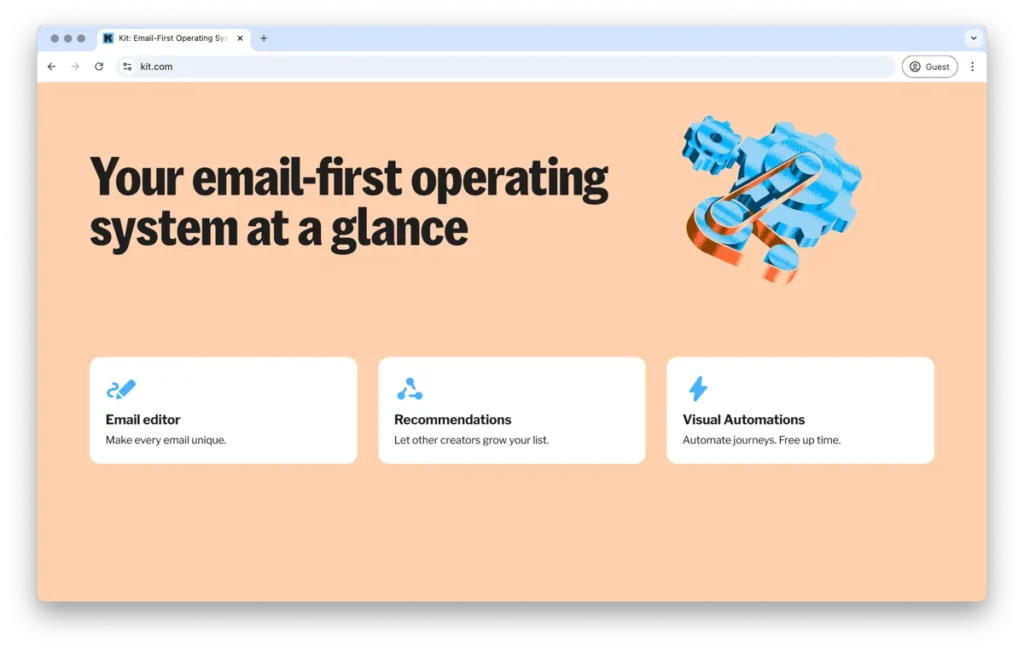
Kit is focused on creators, offering simple automation and audience segmentation.
Overview: Kit is a marketing automation tool tailored for content creators, bloggers, and small businesses. It helps users build email lists, create simple automation sequences, and segment audiences based on behavior. Kit’s minimalistic design makes it easy for non-technical users to start building email funnels and connect with their audience.
Features:
| Feature | Description |
| Email Sequences | Set up automated email series to nurture subscribers. |
| Automation Rules | Simple and effective rules for campaign automation. |
| Landing Pages | Create landing pages to grow your email list. |
| Tag-Based Segmentation | Segment audiences using tags for more targeted campaigns. |
| Creator-Focused | Features designed specifically for content creators. |
- Best For: Creators, bloggers, and small businesses seeking a straightforward email marketing solution.
- Pricing: Kit offers a free plan for up to 1,000 subscribers, with paid plans starting at $9 per month.
13. Zoho Campaigns
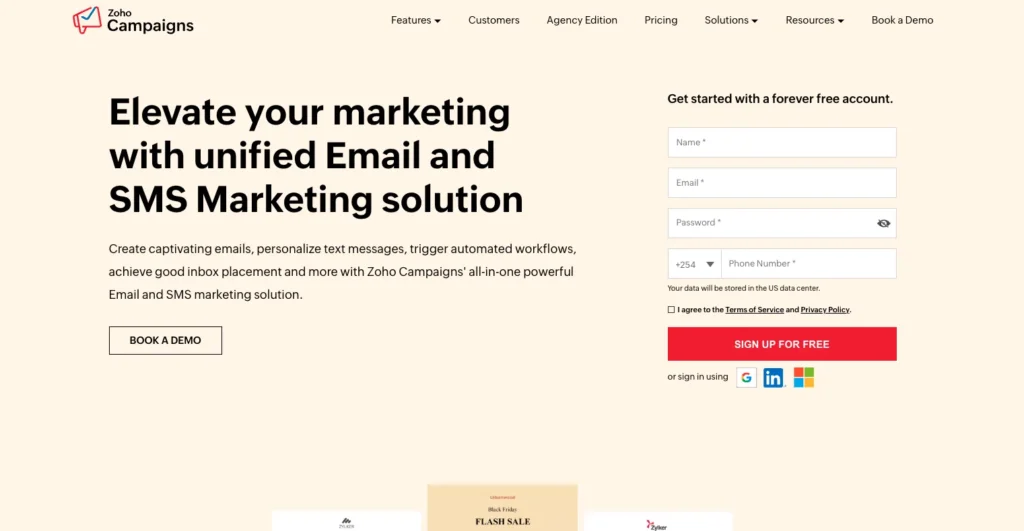
Zoho Campaigns is part of the Zoho suite, offering seamless CRM integration.
Overview: Zoho Campaigns integrates well with other Zoho products, making it an excellent choice for businesses already using Zoho CRM or other Zoho apps. It provides features for email marketing, automation, and detailed analytics. Zoho Campaigns also supports social media integration, allowing users to manage email and social campaigns from a single platform.
Features:
| Feature | Description |
| Email Marketing | Send and automate email campaigns to engage audiences. |
| CRM Integration | Seamless integration with Zoho CRM for unified data management. |
| Automation | Create workflows for automated follow-ups and lead nurturing. |
| Social Media Integration | Manage social campaigns alongside email marketing. |
| Reporting | Track and analyze campaign performance with in-depth reports. |
- Best For: Businesses already using Zoho products, or looking for an integrated marketing and CRM solution.
- Pricing: Zoho Campaigns offers a free plan for up to 12,000 emails per month, with paid plans starting at $4 per month.
Comparison Table
| Tool | Key Features | Pricing | Best For |
|---|---|---|---|
| HubSpot | CRM, Lead Nurturing, Social Media, Reporting | Free, paid plans from $50/month | SMBs, B2B/B2C |
| ActiveCampaign | Email, CRM, Personalization, SMS, Automation | From $29/month | Personalized journeys, segmentation |
| Mailchimp | Email, AI Insights, Omnichannel Campaigns | Free, paid plans from $9.99/month | Startups, ease of use |
| Marketo Engage | Lead Scoring, ABM, Analytics | Pricing on request | Enterprise B2B |
| Omnisend | Email/SMS, Push, E-commerce Integrations | Free, paid plans from $16/month | E-commerce brands |
| Marketing Cloud Account Engagement | CRM, ROI Reporting, Landing Pages | From $1,250/month | B2B with Salesforce |
| Brevo | Email, SMS, CRM, Transactional Emails | Free, paid plans from $25/month | Budget-friendly SMBs |
| Drip | Email, E-commerce Insights, Segmentation | From $39/month | Online retailers, e-commerce |
| GetResponse | Email, Webinars, Landing Pages | From $15/month | Webinar-based lead generation |
| Keap | CRM, Email, Scheduling, Automation | From $79/month | Small businesses, solopreneurs |
| Ortto | Visual Workflows, Multi-Channel, Personalization | From $49/month | Workflow-focused businesses |
| Kit | Email, Automation, Landing Pages | Free, paid plans from $9/month | Bloggers, content creators |
| Zoho Campaigns | Email, CRM Integration, Social Media | Free, paid plans from $4/month | Businesses using Zoho |
This concise table highlights core features to help you quickly compare marketing automation tools based on your business needs.
How to Choose the Right Tool for Your Business
Key Considerations:
- Business Size & Growth: Ensure the tool fits your current scale and can support future expansion, catering to small businesses or enterprise needs.
- Business Needs: Identify critical features—lead nurturing, email campaigns, CRM integration, or multi-channel marketing—to align with your goals.
- Budget: Choose a tool within your budget, noting free plans for small businesses or premium options with advanced features.
- Integration: Confirm compatibility with existing systems like CRMs, e-commerce platforms, or marketing tools for a unified strategy.
- User-Friendliness: Opt for an intuitive tool that reduces your team’s learning curve.
- Scalability: Select a tool capable of handling increasing contacts, workflows, and campaigns as your business grows.
Questions to Ask:
- Alignment with Goals: Does it support objectives like lead generation, nurturing, and retention?
- Support Availability: What support options (live chat, email, phone) are provided? Are there knowledge resources or forums?
- Integration Ease: Does it integrate seamlessly with your existing tools (CRM, analytics, etc.)?
- Budget Fit & Trial Options: Is the tool affordable, and does it offer a trial/demo to test functionality?
- Analytics & Reporting: Does it provide in-depth analytics to track campaign performance and refine strategies?
- Customization: Can it be tailored to meet your specific needs, such as workflows, templates, and segmentation?
By addressing these considerations and questions, you can select a marketing automation tool that aligns with your business goals, drives efficiency, and supports growth.
Conclusion
Selecting the right marketing automation tool can make a significant difference in your business’s ability to scale and achieve growth. By choosing a tool that aligns with your business needs, you can streamline marketing efforts, boost productivity, and enhance customer engagement.
It’s essential to assess your business requirements, budget, and integration needs before making a decision. Each tool offers unique features that cater to different marketing strategies, so understanding what fits best for your company is crucial.
Take action now—evaluate your options, identify the tool that meets your needs, and start scaling your marketing efforts with the right automation solution today. Remember, the right tool will not only save time but also help you grow effectively, reaching new customers and retaining existing ones.
Frequently Asked Questions
What is the difference between marketing automation and CRM?
Marketing automation focuses on automating marketing tasks such as email campaigns, lead nurturing, and customer segmentation. CRM (Customer Relationship Management), on the other hand, is designed to manage customer relationships and track interactions across sales and support.
Is marketing automation suitable for small businesses?
Yes, marketing automation can be highly beneficial for small businesses. It helps save time, manage customer relationships efficiently, and improve marketing campaign effectiveness, all while allowing small teams to operate like larger ones.
Can marketing automation improve ROI?
Absolutely. By streamlining repetitive marketing tasks, optimizing lead nurturing, and providing data-driven insights, marketing automation can significantly improve return on investment (ROI) by making marketing efforts more targeted and efficient.
How do I know if my business is ready for marketing automation?
If your business is dealing with repetitive marketing tasks, struggling to manage a growing number of leads, or seeking to improve customer segmentation and personalization, it may be time to consider marketing automation.
What kind of content can be automated?
Content such as email campaigns, social media posts, SMS marketing, and personalized follow-up messages can all be automated. Marketing automation tools allow you to set up workflows that deliver the right content at the right time based on user behavior.

